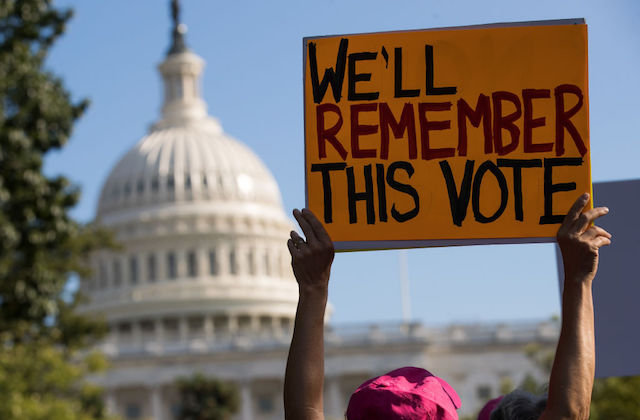Despite several failed attempts to repeal and replace the Affordable Care Act (ACA), Republicans in Congress are once again trying to dismantle the health care system championed by former President Barack Obama.
This time, the vehicle is the Graham-Cassidy-Heller-Johnson proposal (commonly shortened to Graham-Cassidy), crafted by Senators Lindsey Graham (R-SC), Bill Cassidy (R-LA), Dean Heller (R-NV) and Ron Johnson (R-WI). They have until September to pass it as part of the budget reconciliation bill, which lowers the bar for passage to a simple majority vote.
While officials with the nonpartisan Congressional Budget Office released a statement on Monday (September 18) saying that it will not be able to provide a preliminary assessment of the bill until early next week—and won’t weigh in on its impact on the deficit, premiums or the total number of people who will lose coverage for “at least several weeks”—health care consulting company Avalere released an analysis today (September 20). It says that, if passed, the plan would reduce health care-related federal funding to states by $215 billion.
Here’s what you need to know about the bill right now:
It eliminates the insurance mandates. Under this proposal, the government will no longer charge individuals who don’t have insurance—or companies that don’t offer it—a fee, retroactive to 2016.
It drops the Obamacare subsidies. That means that starting in 2020, premiums, deductibles and copays will climb unless states allocate funds to defray costs. And speaking of states…
Red states will come out ahead. If passed, the proposal would issue block grants to states to help fund Medicaid. Because many Republican-led states opted not to expand the program under the ACA, the grants will now represent an increase in funding; in fact 14 of the 15 states that will gain from the block grant system fall in the red column. Meanwhile, solidly blue states like California, New York and Massachusetts will see their budgets slashed by billions of dollars, per The Washington Post. The block grant program would then expire after 2026.
It makes other deep cuts to Medicaid. As CNN Money explains, the program, which 34 million non-elderly people of color rely on for health insurance, would be funded differently if the proposal passes, effectively ending the program expansion. The federal government would issue states a fixed amount of money per enrollee starting in 2020. It would also tie the funding growth rate to standard inflation beginning in 2025, eschewing the faster-climbing medical inflation rate.
It lets insurers charge sick people more. While it will prevent insurance companies from denying coverage, it lets them charge people more based on their medical history. States can also apply for waivers that let insurers charge different premiums based on age.
It says goodbye to the essential health benefits. Under the ACA, all insurance plans are required to cover ten categories of service. Under this new plan, they won’t be, as states can apply for waivers that control what is considered essential. Per Healthcare.gov, the current essential categories are:
- Ambulatory patient services (outpatient care you get without being admitted to a hospital)
- Emergency services
- Hospitalization (like surgery and overnight stays)
- Pregnancy, maternity, and newborn care (both before and after birth)
- Mental health and substance use disorder services, including behavioral health treatment (this includes counseling and psychotherapy)
- Prescription drugs
- Rehabilitative and habilitative services and devices (services and devices to help people with injuries, disabilities, or chronic conditions gain or recover mental and physical skills)
- Laboratory services
- Preventive and wellness services and chronic disease management
- Pediatric services, including oral and vision care (but adult dental and vision coverage aren’t essential health benefits)
It defunds Planned Parenthood. It would restrict federal funding to the health care provider for one year.
Only one Republican senator has publicly opposed it. Rand Paul (R-KY) has been very vocal about his view that Cassidy-Graham does not go far enough to repeal Obamacare.
I can’t support a bill that keeps 90% of Obamacare in place. #GrahamCassidy is not repeal or replace, it is more Obamacare Lite
— Senator Rand Paul (@RandPaul) September 15, 2017
Senators Susan Collins (R-ME) and Lisa Murkowski (R-AK), who opposed the previous iterations of Trumpcare, have not announced how they will vote.
There is tons of opposition to the proposal. Activists are using the hashtag #GrahamCassidy to encourage legislators to vote against it. Senate Minority Leader Charles Schumer (D-N.Y.) told press that no Democrats will support the plan because, “it hurts people in every state.” And nearly a dozen health organizations have voiced concerns, including the American Medical Association, The American Congress of Obstetricians and Gynecologists, and the American Nurses Association:
To #Congress: Graham-Cassidy would result in millions losing coverage, destabilize insurance markets, decrease access to affordable care. pic.twitter.com/p0A1lJf4cx
— AMA (@AmerMedicalAssn) September 19, 2017
#GrahamCassidy blocks patients from cancer screenings, birth control, & STI testing at Planned Parenthood—leaving many without health care.
— ACOG Action (@ACOGAction) September 19, 2017
We stopped #Trumpcare before & we’re going to do it again, this time for good. Make your call now & #ProtectOurCare: https://t.co/uMDnGENZfP pic.twitter.com/Brg45ALOaJ
— RN Action (@RNAction) September 19, 2017
